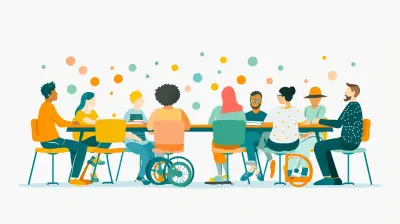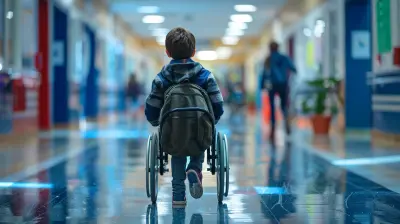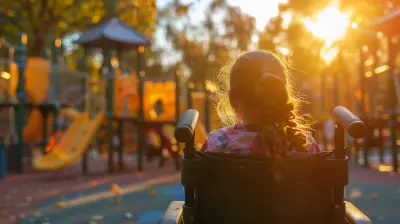The Science Behind Problem-Solving: What Educators Should Know
3 January 2025
Problem-solving is one of the most critical skills students can acquire during their educational journey. Whether it's solving a complex math equation, figuring out how to work in a team, or navigating a tricky social situation, problem-solving is a skill that transcends subjects and real-world scenarios. However, the art of teaching problem-solving is not as simple as presenting a problem and waiting for a solution. There's a science behind it—one that educators should know to guide students effectively.
In this article, we’ll dive into the science behind problem-solving, focusing on cognitive processes, strategies, and how educators can apply this knowledge in the classroom. By the end of this, you'll not only have a better understanding of how problem-solving works but also practical tips to foster this skill in your students.
What Is Problem-Solving?
At its core, problem-solving involves identifying an issue, figuring out the root cause, brainstorming possible solutions, and then implementing the best one. Sounds easy, right? Well, not exactly. The human brain navigates through several cognitive processes to achieve this. These processes differ depending on the problem's complexity, the individual’s prior knowledge, and their ability to think critically.The Cognitive Processes Involved
Let’s break it down. Problem-solving isn’t just one skill—it’s a combination of different cognitive functions working together. Here’s how your brain tackles a problem:1. Perception: The first step is recognizing the problem. If you don’t know a problem exists, you can’t solve it.
2. Memory Recall: The next step is pulling up any relevant past experiences or knowledge that could help. Your brain sifts through its archives to find anything useful.
3. Analysis: Once you’ve gathered information, you analyze it to figure out how it applies to the current problem.
4. Synthesis: This is where creativity comes in. Your brain combines different ideas and pieces of information to come up with potential solutions.
5. Evaluation: Finally, you assess your options and choose the most effective solution.
Sounds like a lot? That’s because it is. And it all happens in a matter of seconds in most cases. But here’s the kicker: not everyone’s brain is equally proficient at each of these stages. That's why some students excel at problem-solving, while others struggle.
The Neuroscience of Problem-Solving
To truly understand problem-solving, we have to dig a little deeper into the brain’s inner workings. Recent advances in neuroscience have given us a peek into how our brains solve problems. Spoiler alert: it’s fascinating!Prefrontal Cortex: The Command Center
The prefrontal cortex is the brain's command center for problem-solving. It handles planning, decision-making, and controlling your impulses—all crucial for finding solutions. This part of the brain doesn’t fully develop until your mid-20s, which explains why younger students may struggle with complex problem-solving tasks.Dopamine: The Brain's Reward System
When students solve a problem, the brain releases dopamine, a neurotransmitter linked to feelings of pleasure and satisfaction. This reward system is crucial because it reinforces positive behavior. In simpler terms, when students solve a problem and feel good about it, they’re more likely to want to tackle similar challenges in the future.The Role of Emotions
Emotions also play a significant role in problem-solving. Too much stress can inhibit the prefrontal cortex, making it harder to think clearly. On the other hand, positive emotions can boost creative thinking, making it easier to come up with innovative solutions. This is something educators need to be mindful of—an overly stressful classroom can stifle problem-solving abilities.
The Different Types of Problem-Solving
You might think that solving a math equation is the same as figuring out why your friend is upset, but those are different kinds of problems. Problem-solving can generally be broken down into two categories: well-defined and ill-defined problems.Well-Defined Problems
A well-defined problem has a clear goal, a specific set of constraints, and a single correct solution. Think of math problems, puzzles, or following a recipe. These problems allow for the application of straightforward, logical steps—a process known as algorithmic thinking.Example: Solving a quadratic equation. You know the formula, the steps, and the answer is either right or wrong.
Ill-Defined Problems
On the flip side, ill-defined problems are a bit messier. They don’t have a clear goal, the constraints might be ambiguous, and multiple solutions could exist. These problems require heuristic thinking, which involves using experience-based techniques for problem-solving.Example: Figuring out how to resolve a conflict between two friends. There’s no “right” answer, and the solution depends on multiple factors like emotions, past experiences, and context.
Common Problem-Solving Strategies
Educators can equip students with a variety of strategies that can help them approach problems more systematically. Below are some of the most effective ones.1. The Trial-and-Error Method
This strategy involves trying different solutions until one works. Though it may seem inefficient, it’s often used when there are multiple possible solutions. It’s particularly effective for ill-defined problems where students need to experiment with different options.2. Algorithmic Thinking
Algorithmic thinking is a step-by-step approach to solving well-defined problems. It’s commonly used in subjects like math and computer science, where each problem has a specific solution.3. Heuristic Thinking
Heuristics are mental shortcuts or “rules of thumb” that help simplify decision-making processes. Rather than going through every possible option, students use past experiences and intuition to find a reasonable solution quickly.4. Lateral Thinking
Lateral thinking is all about approaching problems from new, creative angles. It encourages students to think outside the box and come up with unconventional solutions. This type of thinking is especially vital for ill-defined problems where traditional methods may not work.How Educators Can Foster Problem-Solving Skills
Now that we’ve covered the science of problem-solving, let’s talk about how educators can apply this knowledge. Here are some practical tips for fostering problem-solving skills in the classroom:1. Encourage a Growth Mindset
Students with a fixed mindset believe their abilities are static, while those with a growth mindset believe they can improve with effort. Educators should encourage a growth mindset by praising effort, not just success. When students see failure as a learning opportunity rather than a dead-end, they’re more likely to persevere in solving problems.2. Teach Metacognition
Metacognition is the ability to think about your own thinking. It allows students to monitor their progress and adjust their strategies if they’re not working. Educators can foster metacognition by asking students to reflect on their problem-solving process.Example: After a math exercise, ask students, "What strategy did you use to solve this problem? Was it effective? Why or why not?"
3. Provide Real-World Problems
The best way to learn problem-solving is through practice, and real-world problems are the perfect playground. These problems are often ill-defined, requiring students to employ creative and critical thinking. Consider incorporating projects that ask students to solve actual issues in their community or school.4. Use Collaborative Learning
Collaboration encourages students to share different perspectives and approaches to problem-solving. Group work allows students to bounce ideas off one another, which can lead to more innovative solutions. Plus, it mirrors real-life problem-solving scenarios, where teamwork is often essential.Why Problem-Solving Skills Are More Important Than Ever
In today’s fast-paced, ever-changing world, the ability to solve problems creatively and effectively is more important than ever. Whether we’re talking about navigating the complexities of technology, addressing social issues, or working in a dynamic job market, problem-solving is a skill that will serve students well beyond the classroom.Employers consistently rank problem-solving as one of the top skills they look for in employees. In fact, according to the World Economic Forum, complex problem-solving is projected to be the number one skill required in the workforce by 2025. As educators, it’s our responsibility to prepare students for this future by giving them the tools they need to think critically, creatively, and collaboratively.
Final Thoughts
Teaching problem-solving is about more than just assigning difficult tasks. It’s about understanding the cognitive processes behind it, recognizing the role of emotions, and providing students with the strategies they need to tackle both well-defined and ill-defined problems. By fostering a growth mindset, encouraging metacognition, and providing real-world challenges, educators can cultivate a classroom environment where problem-solving skills flourish.As we continue to learn more about the science of problem-solving, one thing becomes clear: it’s a skill that can be taught, nurtured, and refined. And the more we understand it, the better equipped we’ll be to help our students solve not just academic problems, but the challenges they’ll face in life.
all images in this post were generated using AI tools
Category:
Problem SolvingAuthor:

Anita Harmon
Discussion
rate this article
18 comments
Gabrielle McQuillan
Unlocking the secrets of the mind, this exploration delves into the hidden mechanics of problem-solving. What if the key to success lies in the questions we ask?
February 16, 2025 at 7:53 PM

Anita Harmon
Absolutely! The questions we ask shape our thinking and drive deeper understanding, making them essential tools in effective problem-solving.
Paula Barnes
This article effectively highlights the cognitive processes involved in problem-solving, yet it could deepen its insights by exploring the emotional and social dimensions that significantly influence students' engagement and outcomes.
February 2, 2025 at 12:13 PM

Anita Harmon
Thank you for your feedback! I appreciate your suggestion to explore the emotional and social dimensions, and I’ll consider incorporating those aspects in future discussions to provide a more holistic view of problem-solving in education.
Ian Gomez
Essential insights for effective teaching strategies.
January 31, 2025 at 4:35 AM

Anita Harmon
Thank you! I'm glad you found the insights valuable for enhancing teaching strategies.
Carrie Wolf
Oh, fantastic! Just what we needed—more science to complicate our already labyrinthine teaching methods. Because who doesn’t love a little extra brainwork while juggling lesson plans and classroom chaos? Can’t wait to follow the “science” to my next coffee break!
January 27, 2025 at 5:11 AM

Anita Harmon
I understand your frustration! Balancing new insights with existing methods can be challenging, but effective problem-solving strategies can truly enhance our teaching approaches and student learning. Thank you for sharing your thoughts!
Eli McGehee
This article brilliantly breaks down the essential science of problem-solving for educators. Understanding cognitive processes and strategies empowers teachers to foster critical thinking in students. Implementing these insights can transform classroom dynamics and enhance learning outcomes effectively. A must-read!
January 23, 2025 at 1:45 PM

Anita Harmon
Thank you for your thoughtful feedback! I'm glad you found the article insightful and helpful for educators. Your support means a lot!
Adria McKee
Insightful tips for effective teaching!
January 20, 2025 at 6:00 AM

Anita Harmon
Thank you! I'm glad you found the tips helpful for enhancing teaching strategies.
Melina Bennett
Understanding the science of problem-solving can enhance teaching strategies and foster critical thinking in students effectively.
January 18, 2025 at 5:52 AM

Anita Harmon
Absolutely! Understanding problem-solving science equips educators with tools to enhance their teaching and cultivate critical thinking skills in students.
Megan Shaffer
Thank you for this insightful article! Understanding the science of problem-solving is crucial for educators. It’s inspiring to see how research can inform teaching strategies, ultimately enhancing our students' critical thinking and resilience in facing challenges.
January 16, 2025 at 8:17 PM

Anita Harmon
Thank you for your kind words! I'm glad you found the article helpful in exploring how research can enhance problem-solving in education.
Valeria Lawson
Great insights! Understanding the science of problem-solving can truly transform our teaching methods. It's fascinating how these strategies can empower students to tackle challenges more effectively. Can't wait to apply these tips in the classroom!
January 14, 2025 at 3:56 AM

Anita Harmon
Thank you for your kind words! I'm glad you found the insights valuable and can’t wait to see how you implement these strategies in your classroom!
Misty Roberts
This article brilliantly highlights the critical role of problem-solving in education. Understanding the science behind it empowers educators to foster resilience and creativity in students. Let’s embrace these insights to enhance our teaching strategies and inspire future innovators!
January 10, 2025 at 12:16 PM

Anita Harmon
Thank you for your thoughtful comment! I'm glad you found the article insightful and relevant for enhancing teaching strategies. Let's continue to inspire creativity and resilience in our students!
Victoria Reed
This article effectively highlights the cognitive processes involved in problem-solving. Educators can greatly benefit from understanding these concepts to foster critical thinking and student engagement in classrooms.
January 8, 2025 at 9:35 PM

Anita Harmon
Thank you for your insightful comment! I'm glad you found the article valuable for enhancing critical thinking and engagement in education.
Will McLanahan
This article effectively highlights the key scientific principles of problem-solving relevant to education. Understanding these concepts can empower educators to foster critical thinking and enhance student engagement in tackling real-world challenges. A must-read for teaching professionals!
January 8, 2025 at 4:42 AM

Anita Harmon
Thank you for your insightful comment! I'm glad you found the article valuable for empowering educators and enhancing student engagement.
Anika Alexander
Thank you for this insightful article! Understanding the science behind problem-solving can significantly enhance our teaching strategies and better equip students for real-world challenges. Great read!
January 7, 2025 at 12:47 PM

Anita Harmon
Thank you for your kind words! I'm glad you found the article helpful for enhancing teaching strategies.
Diesel Diaz
This article offers valuable insights into the cognitive processes involved in problem-solving, emphasizing the importance of fostering critical thinking skills in students. Educators will benefit from understanding these principles to create effective learning environments that encourage creativity and resilience in tackling challenges. Highly recommended for all teaching professionals!
January 6, 2025 at 3:52 AM

Anita Harmon
Thank you for your thoughtful feedback! I'm glad you found the insights valuable for educators.
Kai Weber
Mind puzzles: Brain's gym session!
January 5, 2025 at 12:12 PM

Anita Harmon
Absolutely! Mind puzzles are a fantastic way to enhance cognitive skills and problem-solving abilities, much like a workout for the brain.
Delilah Navarro
This article raises intriguing points about the cognitive processes involved in problem-solving. I'm curious to learn more about how these scientific principles can be effectively integrated into classroom strategies. What specific techniques have educators found most impactful?
January 4, 2025 at 1:54 PM

Anita Harmon
Thank you for your interest! Educators have found techniques such as collaborative learning, metacognitive strategies, and real-world problem scenarios to be particularly effective in enhancing problem-solving skills in the classroom. Integrating these approaches can foster deeper understanding and engagement among students.
Caelum Gates
Explore, experiment, and enjoy learning!
January 4, 2025 at 4:24 AM

Anita Harmon
Absolutely! Embracing exploration and experimentation fosters curiosity, essential for effective problem-solving in education.
Ellie Nguyen
This article offers valuable insights into the science of problem-solving, equipping educators with essential strategies to enhance critical thinking skills in their students. A must-read for those dedicated to effective teaching methods!
January 3, 2025 at 9:45 PM

Anita Harmon
Thank you for your kind words! I'm glad you found the insights valuable for enhancing critical thinking in education. Your support means a lot!
MORE POSTS

Open Educational Resources: A Catalyst for Innovation in Education

The Role of Paraprofessionals in Special Education

How to Navigate Special Education Laws and Policies as a Parent

Empowering Educators: Innovative Approaches to Teacher Training

Developing Global Competence in Teachers and Students

How to Start Building Wealth in Your 20s

Supporting Students with Anxiety in Special Education

How to Write SMART Goals for IEPs

Using Technology to Support Collaborative Problem Solving

The Importance of Transition Planning for Students with Disabilities

Creating Inclusive Playgrounds: The Importance of Accessible Recreational Spaces